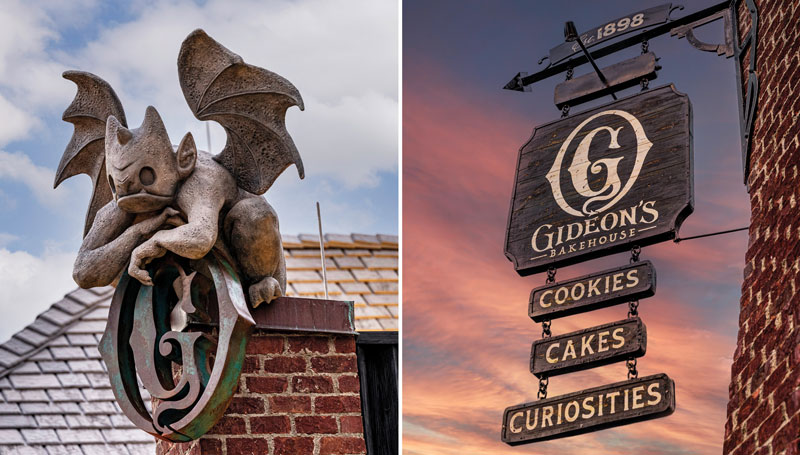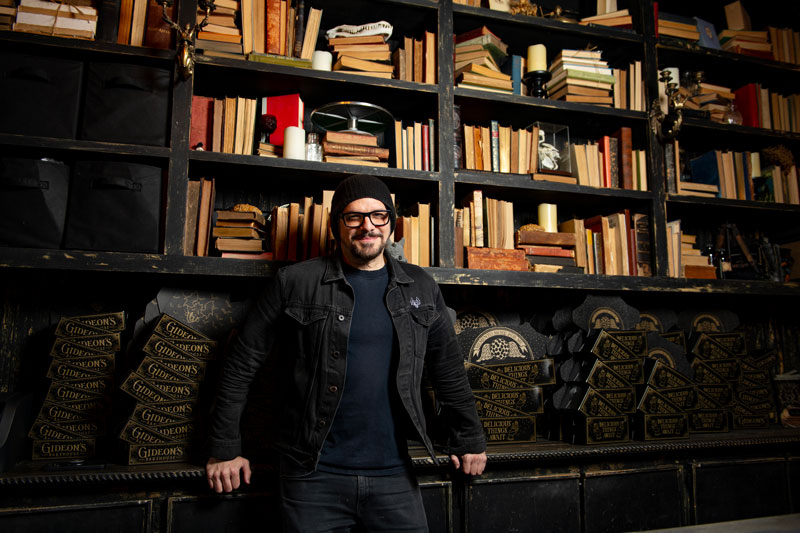
Steve Lewis, a collector of vintage books, once bought a recipe collection published in 1898 and found that a young boy named Gideon had filled the now-yellowed margins with an array of doodles and notes that hinted at dreams of becoming a chef or even a baker.
Whether Gideon’s dream ever came true or not is unknown. But more than 120 years later, his name is synonymous with a burgeoning bakery empire — Gideon’s Bakehouse — with stores in East End Market, which opened in 2016, and Disney Springs, which opened in 2020.
Lewis, the founder, is a quirky character who previously owned a nerd-
friendly comic-book shop and played guitar in a rock band. Clearly, though, he has found his true calling as — according to his website, at least — “The Sublime Prince of the Esoteric Order of the Cookie.”
“Baking has always been my stress hobby,” he says. “I put on The Carpenters and cry in some cookie dough. That’s why I say the secret ingredient in the Gideon’s cookies is my tears.”
The cookies — including Original Chocolate Chip and Triple Chocolate Chip as well as Cookies and Cream and Pistachio Toffee Dark Chocolate — weigh about a half-pound each and cost $6 — which actually seems like a bargain considering their formidable heft.
He sells about 7,000 cookies per day, so you can do the math. But Gideon’s also offers a changeable roster of cakes ($9 per slice) and limited-availability “surprise” items known only to the cognesi who follow the company’s offbeat social media platforms.
By the way, Lewis’s remark about tears wasn’t entirely hyperbole. As a youngster in Staten Island, New York, he was devastated when his parents were divorced and found solace in baking — but rarely followed the instructions on the boxes.
“Almost everything on our menu is my baby and has a story behind it, some going back to my preteens, like the Banana Bread Chocolate Chip Cookie,” he says. “I spent over 15 years working on my Chocolate Chip Cookie recipe, which is extra personal.”
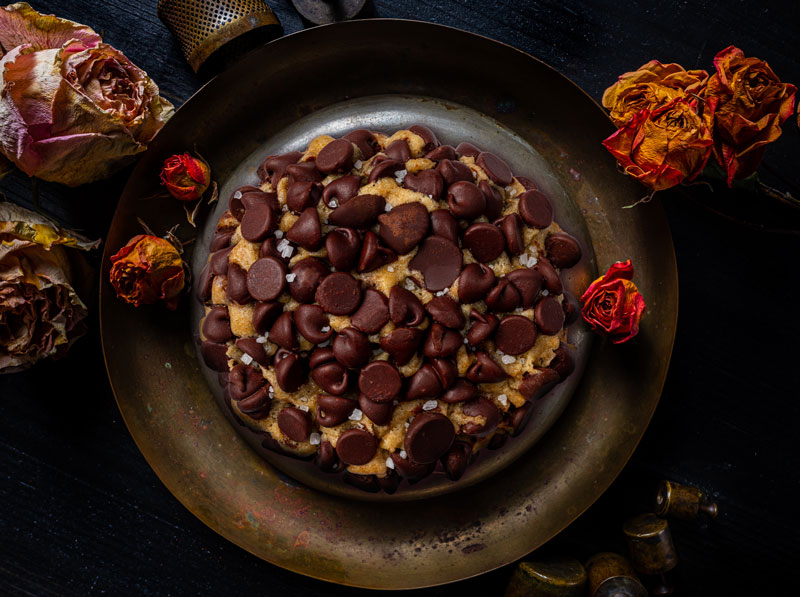
GEEK CHIC CENTRAL
Lewis moved out on his own at age 15 and began performing with a rock band called Bubblegumm, which toured for a decade until a hand injury brought the multi-instrumentalist’s guitar-playing days to an end. Then he relocated to Central Florida to pursue another childhood dream: opening a comic-book shop.
But in business, as in baking, prep is crucial. “I knew I had no experience outside music,” he says. “I’d never really worked at a traditional job, much less run a business. So I moved to Orlando to work for comic shops and try to understand that weird world.”
After talking his way into a job at a mall kiosk, Lewis eventually found himself managing larger and larger stores. All the while, he learned from the mistakes he observed and made mental notes of ways in which he could one day apply a different sensibility to his own operation.
Where other outfits were content to stow cheap comics in boxes on the floor and lazily tape character posters to the windows, Lewis had a vision of something more elegant and sophisticated, where the emphasis would be on artistic expression and special events that could make the customer feel like part of an honest-to-goodness community of kindred spirits.
He got his shot in the early 2000s with the opening of Überbot in the recently opened (and now remodeled) Winter Park Village. The store sold comics, of course, but also hosted cosplay events and did a heavy business in style-forward toys and collectibles that gave the place a more upscale, clued-in feel.
Lewis — usually accompanied by his dog, an Alaskan Klee Kai named Lupin — was a knowledgeable and avuncular presence who often treated customers to the latest “cookie experiments” from his home kitchen. Nerds and geeks, as they called themselves — many of whom found it difficult to find like-minded friends elsewhere — discovered a welcoming refuge at Überbot.
“Sometimes I feel I charmed that business into existence,” recalls Lewis, who became the Pied Piper for local nerd culture. “My greatest takeaway from my years of performing was a subconscious understanding of branding. You’re creating an image of your identity to gain attention and build a following.”
Charm, however, can’t compete with gale-force economic headwinds, and Überbot, for all the goodwill it had earned in the community, ended up a casualty of the Great Recession of 2008.
“I lost everything,” Lewis remembers, “from my store to my home to my emotional well-being.” Then Lupin, his canine companion, died unexpectedly. It was all too much, causing Lewis to suffer what he describes as a depressive episode akin to a nervous breakdown.
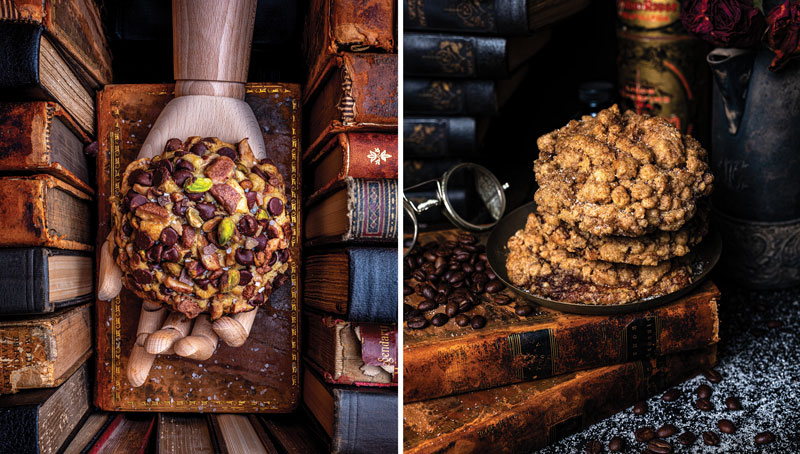
EAST END ADVENTURE
Lewis eventually got a job as a trainer at an Apple Store and, during his off hours, threw himself back into the solace of baking. Soon he was selling cookies from his home and orders were backlogged for months.
Perhaps, he thought, he should build his next business on what he had previously considered a therapeutic hobby. After all, he had a product that people seemed to love and an instinctual — if offbeat — knack for creative marketing.
In October 2016, the first Gideon’s opened in East End Market — Central Florida’s original food hall — on an $800 budget and with one employee. What had been planned as a monthlong summer pop-up gig proved so popular that East End owner John Rife offered Lewis a lease.
Almost out of nowhere, Lewis was making a living off a menu that initially featured only six kinds of cookies. He might have been content to stop right there, had he not come to embrace his restlessness of spirit as an essential part of his very being.
“I love very small businesses and the feeling of being a little secret worked out with Gideon’s,” he says. “I’m also a creative brain that will fall into fits of depression without forward momentum.”
Lewis had decorated the East End space with his collection of vintage books and oddities to give it a haunted Victorian kind of vibe inspired in part by the original Gideon, a dreamer who had from beyond the grave set the wheels in motion for this fledgling venture.
Adding a second location, Lewis reasoned, might enable him to widen the store’s conceptual scope with art and merchandising opportunities that were impossible in the 258 square feet he occupied. The self-described “terrible capitalist,” was ready to grow.
But where? Well, why not at the Happiest Place on Earth? “I’m obsessed with experience, escapism and a feeling of community with my business,” he says. “And at Disney, those ideals are baked in, if you’ll pardon the pun.”
As a trial balloon, he offered the original Gideon’s Chocolate Chip Cookie to another Disney Springs restaurant, The Polite Pig, owned by legendary restaurateurs James and Julie Petrakis, who had also founded the award-winning Ravenous Pig in Winter Park.
Lewis insisted on baking, packaging and delivering the cookies himself — and limiting their quantity so that they would acquire the panache of exclusivity. The popular Disney Food Blog — which is unaffiliated with the attraction — took a picture of a meteorite-sized megasweet and proclaimed it “the best thing to eat” at the theme park.
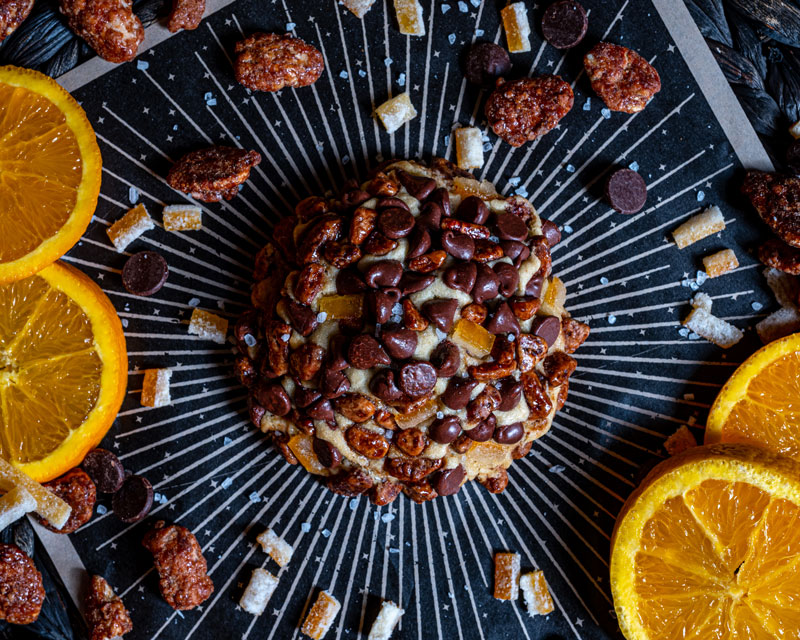
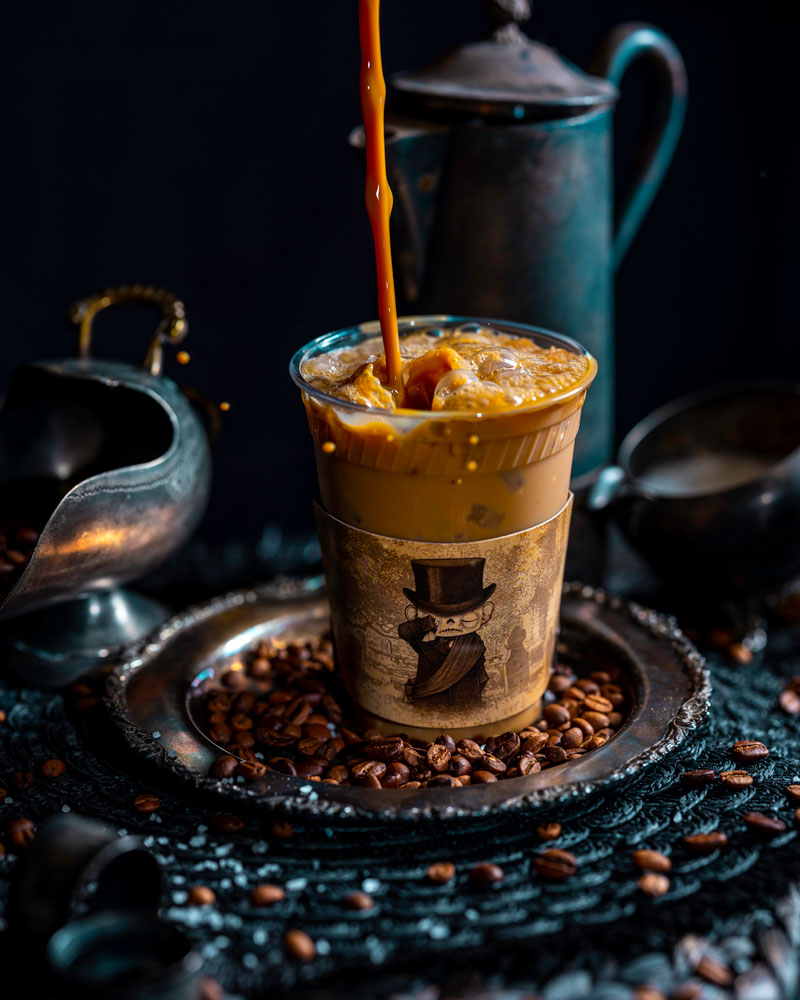
SWEET SUCCESS STORY
A chocolate-studded star was born in the Magic Kingdom. And it quickly caught the attention of Patrick McKinney, a veteran operations manager who was working with The Polite Pig as part of his 14-year career running Disney Springs establishments such as The Boathouse and the T-Rex Café.
McKinney sensed an opportunity — not just for a Gideon’s location at
Disney Springs, but for a formal affiliation between the two in which
McKinney would handle the operational aspects of the business, allowing Lewis (who seems to have been a better capitalist than he had thought) to follow his imagination wherever it took him.
“Personally and selfishly, I wanted to find an opportunity and work with somebody where I wouldn’t have to look for a job again for the rest of my life,” says McKinney, who has an undergraduate degree in hotel, institutional and restaurant management from Penn State University.
Adds McKinney: “That was my commitment to Steve: ‘If we make this work, I’m going to commit the rest of my life to you and Gideon’s.’”
The two are polar opposites in many ways. McKinney — as comfortable operating in the corporate world as Lewis is reticent — is a competitive rower, a martial artist (namely tae kwon do) and an Ironman triathlete. Lewis’s passions, including comic books and unsettling illustrations, leave him puzzled.
“But where we really mesh well together is that we have the same passion for integrity and quality,” says McKinney, whose bald pate likewise contrasts with Lewis’s unshorn tresses. “Steve’s not driven by ego, he’s not greedy, he’s not selfish. And that was very welcoming to me.”
In describing the version of himself that McKinney got to know, Lewis combines confidence and self-deprecation: “I’m a nobody with minimal financial means and no experience dealing with theme-park crowds. But I’m also highly committed to my goals and probably the right amount of stupid.”
McKinney donated 20 hours per week for three years until the pair finally came to terms with Disney for a new Gideon’s — this one measuring a still-cozy 1,257 square feet — that would match Lewis’s vision and occupy a location next to the building where he and his now-ex girlfriend shared their first kiss.
“Disney had faith in my story and creativity and in Patrick’s operational talents and dedication,” is how Lewis explains their ultimate success in sealing the deal. Lewis is now referred to as the company’s “owner and creator” while McKinney’s more whimsical title is “Grand Poobah of Operations.”
The visual motif of both Gideon’s locations adds to the appeal, enveloping even these relatively small spaces in a gently Gothic feel. “Gideon’s is not a theme that I created for the bakery,” he says. “It’s what my brain would look like if you cracked it open.”
Hints of Edward Gorey and Tim Burton can be seen in the artwork of Michael Reyes (also known as “Terribly Odd”), whose endearingly ominous characters peer out from wall portraits and are emblazoned on such purchasable (and now collectible) merchandise as pins, stickers and trading cards.
The relationship between Lewis and Reyes began back in the Überbot days, when Lewis hosted the artist’s first-ever exhibition. “I see Gideon’s as more of an art gallery than a bakery,” adds Lewis. “The sense of urgency and exclusivity that’s such a big part of Gideon’s has more in common with art than food — but food is a form of art, is it not?”
Developing Reyes’s aptly dubbed “miserable” characters into a mythology that extends beyond the bakeries is just one idea Lewis is mulling for the future. Perhaps books, animation and even “sister stores” focused more specifically on characters and their adventures are possibilities.
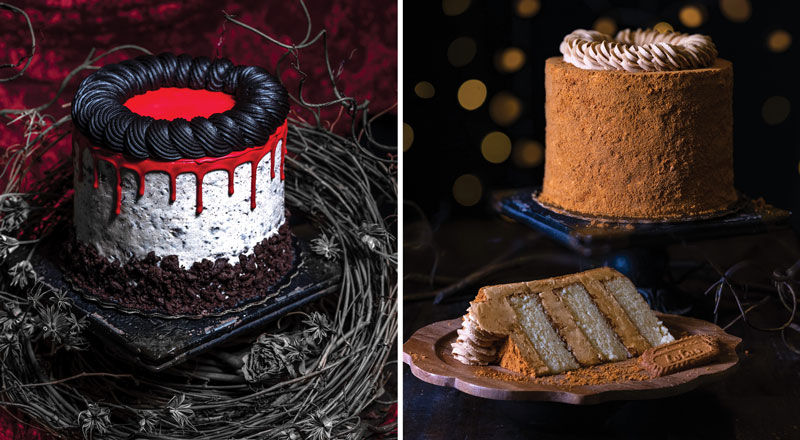
ROLLING IN DOUGH
But for now, Lewis is trying to keep his focus tight. He doesn’t want to get into shipping or delivery — only nonfood merchandise can be ordered from Gideon’s website — and limits how many cookies a customer can purchase to make sure the stores don’t run out of dough by the end of a day.
“I would never risk diminishing what I do in favor of growth,” says Lewis, a quirky introvert who, despite his success, seems almost entirely unmotivated by money. “What is our purpose in life if not experience? I’m just doing my part to create those memories.”
Today, in addition to the two stores, Gideon’s has a 1,120-square-foot production facility and warehouse that encompasses Lewis’s office, a photo studio and a merchandise-processing area. There’s also a 3,630-square foot production kitchen. The warehouse and the kitchen are in Winter Garden.
Lewis no longer bakes — so far, no one has noticed that his tears are no longer mixed with the dough (except perhaps metaphorically) — although he does collaborate with his team on new recipes when he isn’t dreaming up new directions and promoting the company on social media.
With so much going on, Lewis believes it’s probably just as well that he has had no significant other in his life since the project began at Disney Springs. He does, however, have cats: Vincent the Poet and Savant the White. Still mourning the loss of Lupin, his dog, he appreciates the aloofness of cats.
Are these cookies really worth standing in line for? If you get freaked out when you miss a green light, then perhaps nothing — least of all a cookie — warrants a wait that can last several hours or more (unless you get there early and are first in line). But for people who appreciate creativity, innovation and originality — plus doorstop-sized cookies — it appears that delayed gratification is better than no gratification at all.
Anyhow, enough people are willing to join the queue (or to go elsewhere while awaiting a text alert to return and order) that the idiosyncratic company manages to support 180 employees, mostly in production and customer service.
Gideon’s cookies have won Best Dessert in Orlando (Orlando Sentinel), Top 10 Cookies in the U.S. (Sports Illustrated) and Best Cookies Ever (Boston Globe). Gideon’s itself has won Best Bakery in Orlando (Orlando Business Journal, Orlando Magazine and Orlando Weekly). There are dozens of other accolades.
“It’s been an incredible amount of weight,” says Lewis of his most recent business adventure. “And I tend to go into hermit mode when I feel stress.” But he’s grateful to the people of Winter Park, whom he credits with getting him started on his unlikely journey toward becoming a cookie magnate.
“People from Winter Park lined up down the sidewalks of East End Market to get their cookies,” he says. “They were overjoyed when I sold out, even when it meant they went home empty-handed.” Somewhere, the Victorian-
era Gideon — whoever he may have been — is surely smiling and perhaps licking his lips.
